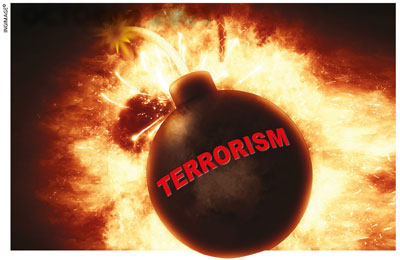THE ROVING DIPLOMAT
TRIBUTE SERIES
OCTOBER 2001
MOVES AND COUNTERMOVES
The conflict in the Middle East and tensions in Africa are making news
Heading the list of recent global developments is the peace process in the Middle East where the goal of peace seems to be more distant than ever. The reason for this is not an inability to resolve differences and issues, but the failure of both Israel and Palestine to end the cycle of violence between them.

This could be due to deliberate collusion or a lack of means to control militants.
There are also acts of provocation like the assassination by the Israelis of the popular leader Abu Ali Mustafa following a missile attack. He was the leader of the second most important group of the Palestine Liberation Organization (PLO) known as the Popular Front for the Liberation of Palestine.
Mustafa is the second prominent PLO leader to be killed; the first being Khalil Ibrahim al-Wazir or Abu Jihad who cofounded the PLO with its Chairman Yasser Arafat.
Arafat declared three days of mourning and said that the Israeli government had set the stage for an all-out war. Another Palestinian leader described this as an act by Israeli Prime Minister Ariel Sharon that invites all hell to break loose.
On the Israeli side, a suicide bomb detonated by a Palestinian youth in a restaurant killed several Israelis. The violence so far has been sporadic and accounted for a death toll of around 600 Palestinians and 180 Israelis. However, it seems to be changing character and transforming into organised military attacks as the Israeli invasion of the town of Beit Jala near Jerusalem indicates.
Beit Jala is a Palestinian Christian town adjoining Bethlehem and its invasion by Israeli military forces represents a dangerous escalation in that it’s the first time Israel has occupied a territory under full Palestinian control. In fact, the US has requested Israel to withdraw from this town.
Understandably, the situation is causing grave international concern and was the subject of discussion at a meeting of the UN Security Council recently.
Africa has been in the news too with the ongoing crisis in Zimbabwe, which is coming to a head. This is the confrontation between President Robert Mugabe and the white planter community in Zimbabwe, and the former’s determination to expel them and seize their lands.
This has resulted in a war of sorts where Mugabe is inciting the locals to seize the lands of British farmers. In the process, violence has ensued against planters and their families, resulting in several deaths and disappearances. The planters retaliated and 21 of them were charged with violence against supporters of the government.
However, the worst is yet to come as Mugabe is likely to unleash his full campaign against the white planters. That will be the listing of some 4,600 white farms for resettlement, which will require that they are vacated in days. Furthermore, the white population has been informed that they must renounce their British passports if they wish to acquire local citizenship.
It’s clear that Mugabe is aiming at expelling the white population ahead of the next presidential election scheduled for 2002 but it is possible that this campaign could give rise to violence and civil war if the whites resist.
Meanwhile, developments in Zimbabwe are being watched anxiously by neighbouring South Africa. This is not only due to the possible effects of an economic crisis in Zimbabwe but also because South Africa itself is facing similar racial conflict. This has resulted in a heavy death toll on the whites and apparently, over a thousand of them have been murdered.
The cause for this conflict lies in the fact that 80 percent of the land in South Africa is owned by whites who account for a mere 11 percent of the population. This campaign of violence against white landowners is being led by black farm workers who are alleging harassment by their white masters as well as radical groups, and demanding the return of stolen land (i.e. land under white occupation).
However, the white community is most concerned about the apparent indifference displayed by the African National Congress (ANC) government to their plight. Yet, South African leaders like President Thabo Mbeki have openly expressed concern about the crisis in Zimbabwe.
The situation in Zimbabwe has caused other external repercussions too with the decision by the government to ban the BBC from covering the forthcoming cricket tour of Zimbabwe by the English team.
Apart from Zimbabwe, Zambia is also facing a possible crisis, given the possibility that Zambian President Frederick Chiluba may face prosecution for abuse of office and misappropriation of state funds, if evidence of this is found as a result of ongoing investigations.



